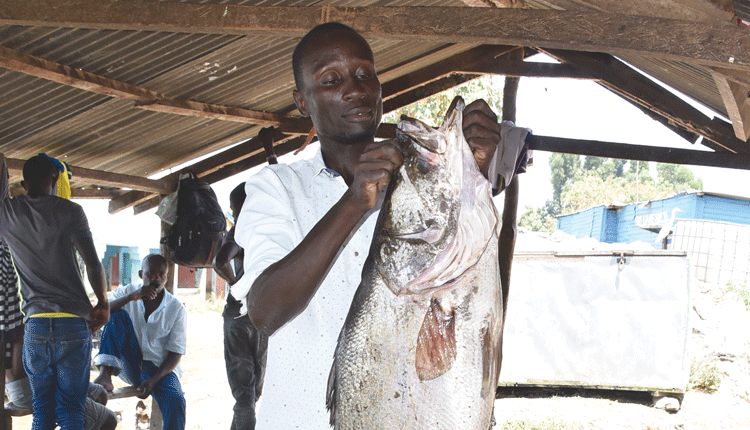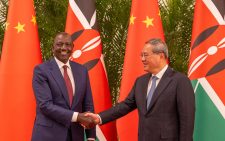Fishers saddled by agony as stocks dwindle in L. Victoria

A large crowd waits patiently on the shores of Nyamware beach in Kisumu county as fishing boats return after a night’s fishing expedition.
They hold their baskets with the hope the fishermen stumbled on migrating fish and captured them after several months of low-catch.
That hope quickly fades away when three boats land at the beach. Four fishermen on one of them empty their nets and it is evident they are not happy.
Just like it has been over a couple of months, the catch is low. Only a handful of small fish that can barely fetch Sh3,000 has been caught.
One of the fishermen, Jared Omondi, a father of five, says they are not surprised with the catch and recounts how dwindling fish stocks are almost pushing them out of the age-old trade.
“Everyday we are counting losses. Several species of fish are slowly disappearing from the lake and the catch is declining,” said Omondi.
The beach is among many across the expansive Nyanza region where fish stocks have declined with fishermen barely struggling to eke out a living.
This comes as fishermen claim illegal fishing gears, pressure on the lake, high rates of pollution and climate change are to blame for the declining fish species.
Fishermen and Beach Management Units officials are in agreement there is a lot of pressure on the lake.
A number of fishermen fear the situation, if not addressed, could be catastrophic in the near future.
The fishermen blame the high cost of fish on the low catch. Some businessmen have also taken advantage of the situation to import fish from China. And the effects are being felt by the fisher folk.
A spot check in several beaches including Nyamware, Dunga, Uhanya, Kaloka, Kuoyo and Usenge established that most fishermen return only with a handful of fish from their expeditions.
Harmful practices
At Nyamware, Omondi claimed the situation has been worsened by frequent floods and the back flow of the lake which has increased siltation.
“There are species of fish that cannot survive where the water is not clean. Tilapia for example is nowadays rare to catch but it is because of the mud deposits and pollution,” he says.
John Siunya, the BMU chairperson at the beach, however, blames the reduction in catch on over-fishing and climate change.
He claims several fishermen have now resorted to using illegal fishing gear to boost catch. The consequence, however, is they end up catching immature fish.
“There is a lot of pressure on the lake. There are many boats and few fish. Some fishermen are also taking advantage to introduce illegal fishing nets,” he says.
In the past few years, KCG has mounted campaigns to seize illegal fishing nets as part of the efforts to reduce the dwindling fish stocks in the lake.
At Usenge beach in Siaya, Samuel Omondi, a fisherman claimed that the high cost of fuel to power their fishing boats means that they have to find ways to get returns.
At Dunga beach, however, fishermen blame the decline on the heavy pollution around the lake.
Maurice Lisodhi, the Dunga BMU vice chairman, attributes the drop of fish stock in the region to pollution.
He says the decrease has forced fishermen to divert from natural fishing to the new technology of aquaculture.
Low revenue
He also said climate change has affected them from last year when there was back flow of Lake Victoria to now when there is reduction of water in the lake and appealed to the government to give them grants so they can venture in aquaculture.
“I urge the government to give us funds to venture into aquaculture so that we can allow young fish in the lake to grow,” he said, adding that low fish catch has lowered the revenue of the beach unit to sustain most of their services.
Some fishermen, he said, have been forced to venture into other activities to enable them fend for their families especially during this period of hard economic times.
From Usoma beach, Andrew Oduor, the BMU chairperson says the growth of papyrus has affected fishing activities in the lake.
He also accused some fishermen of fishing all the time.“Some fishermen even harvest fish with their eggs which is not right, “he said adding that the government should give them fish cages.
At Litare beach in Homa Bay, Julius Aruga, a fisherman and a boat owner said they are facing the same challenges.
He says earlier, the lake would be closed to allow fish to grow, but that, however, is now a thing of the past as the lake has become free for all.
“I am appealing for a ban on fishing in Lake Victoria for a certain period of time to allow fish to grow. That way, we will stop lamenting there is no fish in the lake.”
Revive sector
Jenifer Achieng, a fish monger says she was forced to quit the business when fish prices started shooting up and when sometimes she would not get fish to sell.
She says with the little money she was left with from fish selling business, she opted to venture into second hand clothes business. Michael Nyaguti, an environmental activist, however, blames the government for abandoning the lake.
Homa Bay County fisheries director George Okoth said fish production in Lake Victoria has reduced to 25,000 metric tonnes annually from a high of 100,000 metric tonnes 20 years ago.
Illegal fishing is a major problem. Rogue fishermen have introduced trawling, an illegal practice that has interfered with fish population in the lake.
County Agriculture and Fisheries executive Aguko Juma said they are working with other agencies, including Kenya Maritime Authority and KCG, to eliminate such practices.
Homa Bay Senator Moses Kajwang last month said he will make a statement in the Senate on the state of collapsed fish factories in Nyanza and seek government intervention to revive them.
He called on Nyanza governors to take advantage of the factories to create job opportunities. “County governments can use the factories to do value addition and transform rural communities.
There could be other factors that affect the growth of fish factories in Nyanza. We must address them,” he said.









